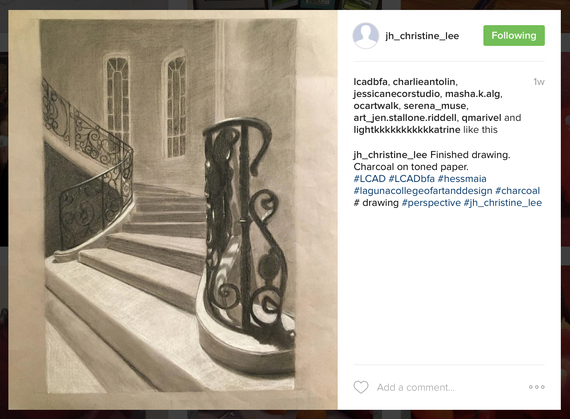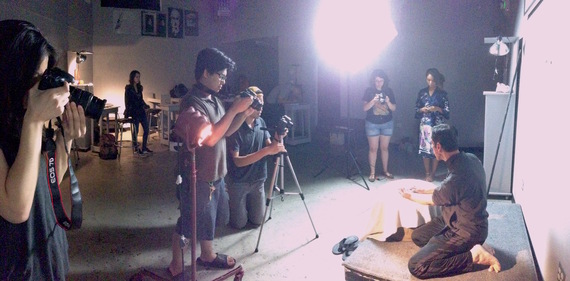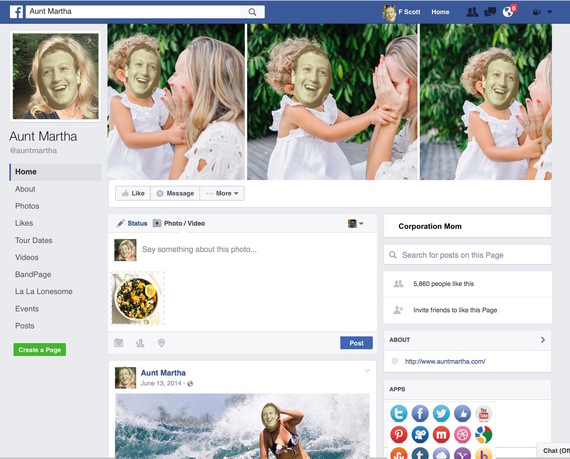My Making Art in the Internet Age class continues to blow my mind on a weekly basis. Last Thursday, the conversation started when one student objected to my use of the term 'bad' when saying something about art work online. She didn't think good/bad worked anymore. It was judgmental. "It is just your opinion." I suggested they were all learning to be art experts, and that they should have opinions. Once you learn to do something difficult, and do it well, you can see that some work is just less. It is amateur and can be really bad. The response was, "but if the artist really enjoyed doing it, it is important for them, and who are we to say otherwise?"
This generation also doesn't seem to read art criticism. I know I read much less than I once did, and place the blame for that squarely on my increased computer usage and my resulting decreased attention span. I assume my students read substantially less than students of 25 years ago, but they also don't consider the opinion of art critics to be relevant. A student said, "I think art critics are an anachronism." I replied that my generation learned a hell of a lot from reading criticism, and in turn getting criticism from colleagues and the press. As I was aware from other classes, this generation looks at and learns from Instagram. Their responses are visual and visceral. They are either energized by an image, or they scroll down.

Student Instagram posts (from upper left clockwise): @ninaulett @pottaytertots @yalda_sepahpour @shannonfody @charlieantolin @justin_tecson20
These students are bright and curious about the world. Though my class is too small to give a broad sampling of their generation, much of what I hear from them jives with my prior teaching experience with this age group. They are astonishingly skilled, love painting and drawing, go to museums, and discuss art amongst themselves. Still, as the conversation about criticism progressed it led to an astonishing admission that left the whole class nodding in agreement. They don't criticize or get negative, online specifically, but more generally in life situations. That has become a social no-no. "Then you'd be like a bully." "What do you mean?," I asked, not doing a very good job of hiding my incredulity. A student replied with a story about hip-hop and how it had changed over ten years. "Stuff you could say back then would now get you labeled as a hater."
The general consensus was that if you speak negativly, or express your dislike of something someone has done, then you're a hater or a bully. I remember a sense of discomfort when my youngest daughter, who is of this college age group, won a participant trophy for losing a race in a swim meet. She was seven. The logic of the era was that you didn't want to damage the budding young egos of these kids by having them lose. Fast forward 15 years and combine those carefully protected egos with the etiquette of social media and you begin to understand the logic of their anti-criticism stance.

Posted student work by @jh_christine_lee
This is the first generation that has grown up since day one with a computer screen before their eyes. Presumably a substantial amount of that growing time was spent experiencing a virtual life, so it is logical that the rules of social engagement at work online would have ramifications for real life etiquette. I've not read of any studies on this, but a shift in the communal mindscape seems to be occurring, and that little phone in your pocket is the main engine of change.
I had to curb my own social instincts a few years ago when I began using Facebook. I approached FB as an art business venture, a form of free advertising with a human face. You learn to be pleasant, encouraging, friendly, laudatory, and maybe funny, or you'll end up being blocked as an unpleasant curmudgeon. Negative feedback makes for bad business, and social media has turned us all into smiling corporate start-ups.
As I told my students the first day of class, even their Aunt Martha is a corporate entity. If the Supreme Court has made all corporations people, then social media has made all people corporations. Aunt Martha puts out ads for her 'brand', touting her adorable kids, arousing desire with shots of her roasted kale lunch, evoking envy with her Hawaiian surfing vacation. It isn't a true version of Aunt Martha's rather average life, it is her 'branded' corporate facade.
I told my class we were going to run with this idea. Let's approach social media like artist mercenaries. If this younger generation sees merit in the stockpiling of 'Likes' and 'Followers' then let's explore that. Let's learn how to operate on this capitalist battlefield. I think only by experiencing success here, seeing what art scores a direct hit and what bombs, are they going to eventually break through that glitzy but shallow popularity wall and find out what kind of art is really meaningful for them, and for their generation. I hope it won't end up being what is most popular and most liked. But maybe I'm just being too critical!


